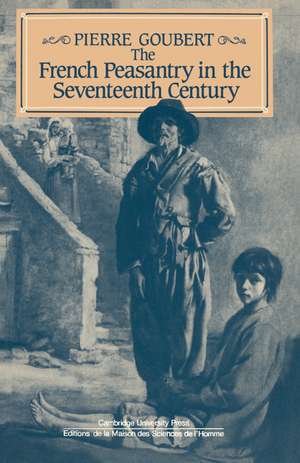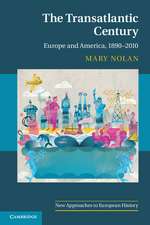The French Peasantry in the Seventeenth Century
Autor Pierre Goubert Traducere de Ian Pattersonen Limba Engleză Paperback – 25 iun 1986
Preț: 203.28 lei
Nou
Puncte Express: 305
Preț estimativ în valută:
38.90€ • 40.61$ • 32.19£
38.90€ • 40.61$ • 32.19£
Carte tipărită la comandă
Livrare economică 04-18 aprilie
Preluare comenzi: 021 569.72.76
Specificații
ISBN-13: 9780521312691
ISBN-10: 0521312698
Pagini: 256
Ilustrații: 1
Dimensiuni: 140 x 216 x 15 mm
Greutate: 0.36 kg
Editura: Cambridge University Press
Colecția Cambridge University Press
Locul publicării:Cambridge, United Kingdom
ISBN-10: 0521312698
Pagini: 256
Ilustrații: 1
Dimensiuni: 140 x 216 x 15 mm
Greutate: 0.36 kg
Editura: Cambridge University Press
Colecția Cambridge University Press
Locul publicării:Cambridge, United Kingdom
Cuprins
1. A bird's-eye view of the French countryside; 2. Peasants and the land in the seventeenth century: possession and 'holdings'; 3. Houses: outside and in; 4. Birth and survival; 5. Peasant marriage; 6. The different types of peasant families; 7. Daily bread; 8. Labourers at work; 9. The well-off and the wealthy: or from the farmer to the tax collector, by way of the money-lender; 10. Vine-growers; 11. Peasants-plus: or from the semi-artisan to the semi-shopkeeper, via the schoolmaster and various other figures; 12. The peasant and his parish priest; 13. The peasant and his seigneur; 14. Peasant power; 15. The peasants and taxation; 16. Peasants in the revolts of the seventeenth century; 17. Sundays and feast days; 18. Death and the peasant.
Recenzii
'[This book] provides by far the most lucid summary of what is known about the environment and daily preoccupations of the peasantry, tempered by a constant awareness of the fact that the overwhelming majority never possessed very much and left little behind with which to reconstruct their world; Goubert's final chapter on Death and the Peasant, which in part is a rebuke at those who fail to recognize the acute limitations of the evidence, concludes with an emphatic reminder of the impenetrability of the peasants' deepest thoughts, in the face of which 'the historian can only remain silent'. It is this scepticism, harnessed to Goubert's formidable erudition, which enables him to distil from his own research and an extensive secondary literature the essential features of peasant life and its larger historical context … His empathetic insight, balanced judgment and grasp of technicalities combine to produce a highly readable essay, offering the sort of rich and stimulating perspective which comes from a lifetime's reflection.' The Times Literary Supplement















